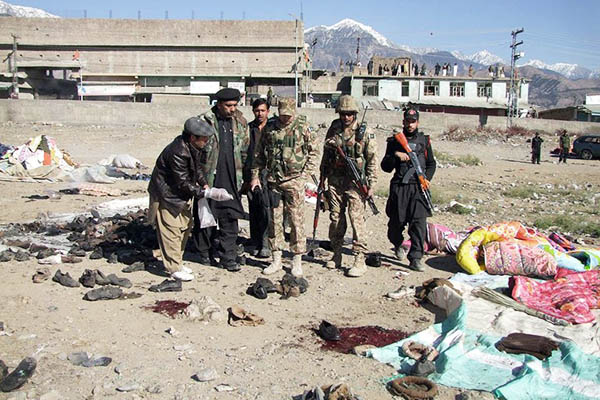
M. Saqlain—AFP
At least 23 people killed, 30 others injured in blast targeting Shia-majority region.
Sectarian militant group Lashkar-e-Jhangvi claimed responsibility Sunday for a bombing that killed 23 people at a crowded bazaar in a predominantly Shia area of Pakistan’s tribal region.
The hardline Sunni organization said they had planted an IED at the Eidgah used-clothes market in Parachinar city in retaliation for Shia support of Iran and Bashar al-Assad. “We warn the Shia parents that if they don’t stop their children from participating in the war of Bashar al-Assad, they would face more attacks like this,” Ali Bin Sufiyan, believed to be a spokesman for Lashkar-e-Jhangvi, said in a message to the media.
Kurram Agency, where the attack took place, is known for sectarian clashes between Sunnis and Shias. Shias make up roughly 20 percent of Pakistan’s population of 200 million.
Local television footage showed hundreds of male shoppers fleeing the area, which was strewn with clothing and debris from the bomb as police tried to cordon off the location and ambulances rushed to the site. Beyond the two dozen killed, the blast also injured 30 more people, most of whom were being treated at a Peshawar hospital and a military medical facility, said Amjad Ali Khan, the political administrator of Kurram.
“The death toll has reached 23 as many of the critically wounded succumbed to injuries as they were being shifted to helicopters to fly them to Peshawar,” Khan told AFP.
Sajjad Hussain, 43, who owns a shop at the market, said he was bringing tea from a nearby stall when the blast went off. “The explosion was huge, it threw me back five feet and human flesh and blood hit my face and body, I was covered all over,” he told AFP in the Lady Reading Hospital Peshawar, where he was being treated for shrapnel wounds to his legs. Twenty-four-year old Aftab Alam, who cleans vehicles at the market, said he was sitting in a van when he heard the blast.
“There was a loud bang and something hit my shoulder, a pool of blood was coming out of my shoulder and when I stepped out of the van there was dust and smoke and everybody was screaming,” Alam told AFP at the same hospital. “The air was filled with the stench of burnt human flesh and blood,” he said.
Prime Minister Nawaz Sharif’s office issued a statement condemning the blast, which received widespread condemnation from political leaders across the country. “Our resolve to eradicate the menace of terrorism is getting stronger and stronger with the loss of innocent lives and sacrifices of the officials of Pakistan Army and law enforcement agencies,” the statement said.
Kurram is one of Pakistan’s seven semi-autonomous tribal districts which are governed according to local laws and customs, and sits close to the border with Afghanistan. The district is on the frontline of Pakistan’s battle against an Islamist insurgency that began in 2004 after the U.S.-led invasion of Afghanistan forced Taliban and Al Qaeda militants to flee across the border. That insurgency has claimed the lives of around 25,000 civilians and security forces’ personnel, according to the South Asia Terror Portal.
Overall levels of violence have decreased this year following a nationwide military-led offensive against militants, which has also centered on groups who target Shias and preachers who incite hatred.
In July, the head of Lashkar-e-Jhangvi, Malik Ishaq, was killed in a shootout with police, along with 13 other extremists. Ishaq had openly boasted of murdering more than 100 people as part of the group behind some of Pakistan’s worst sectarian atrocities, but his death was seen by analysts as an extra-judicial killing by the state. Haroon Bhatti, a key deputy to Ishaq, was killed in a similar shootout late last month. Despite their deaths, attacks against the minority have persisted.
In October a suicide bomber blew himself up at a Shia religious procession in Jacobabad, killing 24. In May gunmen who pledged allegiance to the Islamic State group opened fire on a bus in Karachi carrying Ismaili Shia Muslims, killing 44.
The deadliest-ever attack against Pakistani Shias came in January 2013 when a suicide bomber blew himself at a snooker hall in Quetta. As rescue workers rushed to the scene, a truck packed with explosives parked nearby also detonated, with the overall toll close to 100 dead.
